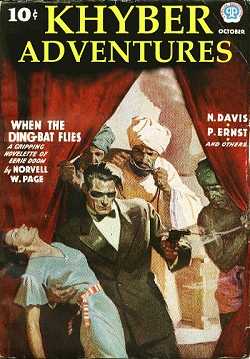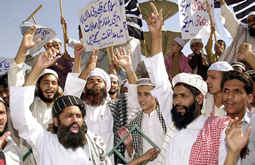
| WaPo wakes up a little bit, but they still don't get the idea that the Talibunnies, the local gunnies, and the ISI are just different fingers on the same hand. |
| So I guess the Talibunnies advance into Peshawar is off for a week or so ... |
| He has to say that but the fact is the frontier police were outgunned and about to be overrun, and there's no good way for the central government to explain that to the West. |
The build-up of security forces in the Khyber Agency and the city of Peshawar, a densely packed urban hub about 30 miles from the border with Afghanistan, signals a major strategic shift in the country's struggle to quell extremist activity. Peshawar officials and local residents say a state of high-anxiety has besieged the city of 3 million. Many in the region fear that a major clash between Pakistani security forces and militants in Peshawar could spark a large-scale conflict that could engulf the entire North-West Frontier in violence.
| Not that the NWF is all that peaceful right now ... |
Peshawar, which is a little more than 100 miles from the Pakistani capital of Islamabad, has witnessed periodic clashes with Taliban militants and local warlords within the last year. Until now, however, Pakistani authorities have steered clear of direct or large scale confrontations with the rising number of insurgents in the area.
| Since partners generally try to work things out between them quietly ... |
Peshawar and the Khyber Agency are also located at the crossroads of a decades long Taliban insurgency that spans the the porous 1,100 mile border between Pakistan and Afghanistan. The city has been a hothouse of militant extremism, playing host to numerous Islamic fundamentalist heavyweights, including at one time al-Qaeda leaders Osama bin Laden and his top lieutenant Ayman al-Zawahiri.
But within the past two years it is lesser known Islamic insurgents and local warlords in Pakistan's restive tribal areas who have taken center stage. More than a half dozen top warlords with Taliban links or sympathies operate openly in the seven tribal agencies, including the Khyber Pass agency, Peshawar's nearest neighbor along the so-called tribal belt.
In more recent months, militant warlord Mangal Bagh Afridi has presented the biggest threat to security in the region. Leader of the increasingly powerful militant group Lashkar-e-Islam, Bagh, an illiterate former bus driver, rose to power through his activism with local trade unions in the area.
| And through murder, preaching, murder, gun sex, murder and pillage ... |
Lashkar-e-Islam has essentially formed its own shadow government in the tribal agency. Despite an official government ban, Bagh's group operates its own pirate FM radio station as part of its effort to gain the sympathies of the local tribesmen, recruit new fighters and terrorize their opponents. Lashkar-e-Islam members have destroyed dozens of CD shops in the tribal agency under orders from Bagh. Members of rival groups have even accused Lashkar-e-Islam activists of extorting money from truckers moving between Afghanistan and Pakistan.
Although Bagh has publicly denied any connections with the Pakistani Taliban or al-Qaeda, his efforts to impose strict Muslim codes in Bara mark him as one of the more ardent extremists operating in the region.
A senior Pakistani government official in Peshawar said authorities have been aware of Bagh's exploits in the region but have refrained from moving against him. The senior official, who spoke on condition of anonymity because of the sensitivity of the matter, said that local authorities in Peshawar were ordered by high-ranking military intelligence officials in Islamabad to allow Bagh to continue operating his shadow government. 'Mangal Bagh has been here for quite some time now but it's a fact that we have tolerated him because we've been told to do so,' the senior official said.
| The government, the agency, the military and the ISI, working hand-in-glove ... |
| I bet he had enough time to take his accordion with him ... |
Paramilitary troops also destroyed Lashkar-e-Islam's headquarters in the town of Shalobar near Bara. Shoaib Afridi, a Lashkar-e-Islam commander, was injured and another of the group's fighters was killed during the assault on the headquarters, according to local media reports.

 Former Prime Minister and
Former Prime Minister and  BARA: At least 10 more tribesmen have been killed and four others injured in clashes between Lashkar-e-Islami and Ansarul-Islam activists in Tirah valley, Khyber Agency. AI activists attacked an LI bunker late on Tuesday night, killing three LI activists and injuring four others. In the ensuing gunbattle, seven attackers were killed, and the rest fled, according to unconfirmed reports. Violence erupted in the area when political authorities established the AI to counter the LI, headed by
BARA: At least 10 more tribesmen have been killed and four others injured in clashes between Lashkar-e-Islami and Ansarul-Islam activists in Tirah valley, Khyber Agency. AI activists attacked an LI bunker late on Tuesday night, killing three LI activists and injuring four others. In the ensuing gunbattle, seven attackers were killed, and the rest fled, according to unconfirmed reports. Violence erupted in the area when political authorities established the AI to counter the LI, headed by  PESHAWAR:
PESHAWAR:  The Khidmat-e-Khalaq Committee Bara (KKCB) has announced to hold a protest rally in front of the Parliament House on Tuesday (today) against the continued curfew in Bara that entered its ninth day on Monday. Jan Wali Afridi, the KKCB president, while announcing the rally at the committees central office at Spin Qabar, requested the committee members and all peace loving Afridis to participate in the rally on Tuesday. A large number of political activists, tribal elders, students and members of the KKCB attended the meeting.
The Khidmat-e-Khalaq Committee Bara (KKCB) has announced to hold a protest rally in front of the Parliament House on Tuesday (today) against the continued curfew in Bara that entered its ninth day on Monday. Jan Wali Afridi, the KKCB president, while announcing the rally at the committees central office at Spin Qabar, requested the committee members and all peace loving Afridis to participate in the rally on Tuesday. A large number of political activists, tribal elders, students and members of the KKCB attended the meeting.